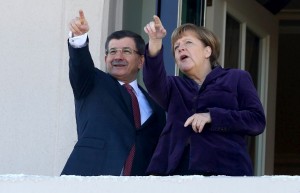Special to WorldTribune.com
Germany fully expects Turkey to honor a deal limiting refugee flows to Europe despite the resignation of Prime Minister Ahmet Davutoglu, with whom German Chancellor Angela Merkel hammered out the deal.
“The chancellor has worked very well until now with Davutoglu and all Turkish representatives and we assume that this good and constructive cooperation will continue with the new Turkish prime minister,” German government spokesman Georg Streiter told reporters on May 6.

“The EU and Germany will continue to fulfill all their obligations under the agreement and we expect this from the Turkish side as well.”
German Foreign Minister Frank-Walter Steinmeier told news website Spiegel Online that the EU pact “must be decisively implemented regardless of the people in office – by Turkey as well as in Europe.”
Davutoglu’s resignation has shaken western observers as it is expected to further strengthen President Recep Tayyip Erdogan’s grip on power.
A senior member of Merkel’s Christian Democratic Union party, Norbert Roettgen, called the departure of Davutoglu, who announced he was stepping down on May 5, “bad news for Europe and Turkey.”
“Davutoglu wanted to move Turkey toward Europe on all issues that are important for Europe,” he told German public radio. “Erdogan is dead-set against that.”
German refugee rights group Pro Asyl said it feared for asylum seekers in Turkey after Erdogan consolidated his power.
“The forced resignation of Davutoglu shows that Turkey is still miles away from being a country under the rule of law,” its managing director Guenter Burkhardt told AFP.
Meanwhile, as Europe and the West were digesting Davutoglu’s shock move, his departure is not likely to be mourned in Israel “not because Israel has any faith in Erdogan, but rather because Davutoglu’s attitude toward Israel and the Jews was not seen as much different or better than Erdogan’s,” the Jerusalem Post reported on May 6.
Davutoglu “was the ideological architect of Ankara’s foreign policy under Erdogan, a foreign policy that has essentially left Turkey friendless in the region, with the exception of Hamas and Qatar,” the report said, adding “it is a foreign policy that placed at its center a distancing from Israel.”
As Hay Eytan Cohen Yanarocak, a researcher on Turkey at Tel Aviv University’s Moshe Dayan Center, wrote in 2012 in The Jerusalem Review, “Understanding the roots of the current Justice and Development Party’s (AKP) foreign policy toward Israel first requires a knowledge of Davutoglu’s perception of the Jewish state.”
Yanarocak pointed out that Davutoglu published a book in April 2001, called Strategic Depth, in which he outlined his anti-Israel sentiments, “declaring that a Jewish Israel is not suitable to the Middle East, and emphasizing differences between anti-Semitism and anti-Zionism.
“As the mastermind of neo-Ottomanism, which encourages Turkey to promote engagement with the nations of the former Ottoman Empire and influence their policies, Davutoglu argued that Israeli- Turkish relations undermined the implementation of Turkey’s responsibilities derived from its Ottoman past,” Yanarocak wrote. Davutoglu, he pointed out, accused the Turkish Armed Forces of adopting an Israel-oriented foreign policy.
The Post report said Davutoglu’s “anti-Israel positions and rhetoric often equaled those of Erdogan,” citing NATO’s decision this week allowing Israel to open a permanent office in its headquarters in Brussels, which “Davutoglu boasted in 2011 that Turkey had kept that same exact move from happening then.”
Maj.-Gen. Yair Golan, the IDF deputy chief of staff, said that “as long as Turkey is ruled by a party with a strong Islamist orientation, by a ruler as adversarial as Erdogan, as long as this is the situation – we can expect problems and challenges.”
Davutoglu’s exit “will not change that, unless Erdogan believes that his country’s unenviable strategic situation is self-defeating, and he wants to break out of it,” the Post conluded.
